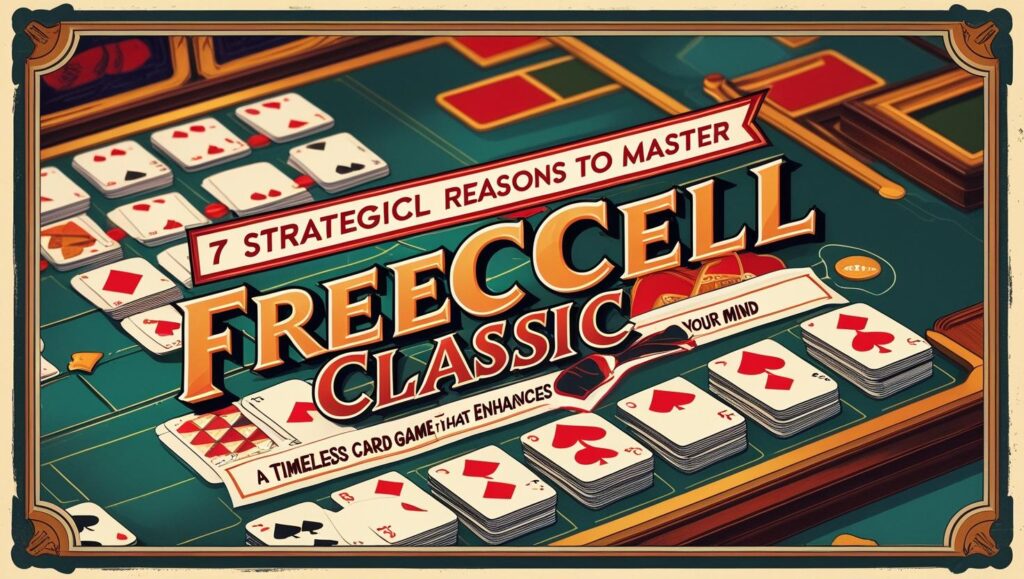7 Strategic Reasons to Master FreeCell Classic: A Timeless Card Game That Enhances Your Mind
Introduction: Why FreeCell Classic Still Reigns Supreme
In a game landscape dominated by slick graphics and hyper-competitive multiplayer gameplay, FreeCell Classic remains a reminder of the timeless appeal of logic-based game design. Originally released as part of the Microsoft Windows Entertainment Pack in the early 1990s, FreeCell has gone on to establish itself as one of the most mentally rewarding solitaire variants to ever have been developed.

This isn’t just a card game—it’s mental training, pattern recognition, and strategic thinking rolled into a deceptively simple interface.
In this post, we’ll break down seven strategic advantages of mastering FreeCell Classic, highlight key steps to play effectively, and provide analysis on why it remains a valuable mental workout even decades after its debut.
1. Boosts Logical Thinking and Pattern Recognition
FreeCell Classic is a game that encourages logic and patience rather than fortune. In contrast to other solitaire games that can be very dependent on luck of the cards, each FreeCell puzzle can be solved with ideal strategy (with the exception of an infrequent few).

This enables the player to hone problem-solving capabilities, improve pattern recognition, and cultivate the capacity for thinking several moves ahead. For gamers who delight in mental gymnastics, FreeCell Classic presents limitless possibilities for extending those neural circuits.
2. Teaches Strategic Resource Management
One of the characteristic features of FreeCell is the employment of four available cells—thus the name—which provide temporary storage for cards. This bounded space constrains players to make optimal choices, optimize moves, and avoid wasteful actions.
Developing the timing and usage of these cells is essential, so the game is an ideal learning device for resource management techniques that can also be used outside of a game setting.
3. Enhances Patience and Concentration
Whereas quick games that are intended to deliver instant gratification of the dopamine system, FreeCell Classic demands attention and patience. Most problems take a couple of minutes to solve and may necessitate thoughtful contemplation of each step.
This not only improves attention span but also reminds one of the value of slowing down and studying a problem rather than hurrying towards a rapid (and often misguided) solution.
4. Free, Accessible, and Platform-Independent
One of the superior attributes of FreeCell Classic is that it is accessible. It’s free, doesn’t require top-of-the-line hardware, and plays on a broad spectrum of platforms—from Windows and Mac to mobile browsers and Android/iOS apps.
Its lightness makes it ideal for spontaneous mental pauses without the stress or configuration needed from heavier games.
5. Helps Memory and Sequential Thinking
To win a FreeCell game, it is often necessary to remember the position and state of many cards across a series of moves. This obviously enhances short-term memory and leads players to think in sequences—anticipating what will occur not only in the next move, but three or four ahead.
This exercise has also been linked to enhancing real-life skills such as planning, analysis, and even verbal intelligence.
6. A Game with Established Longevity and Popularity
FreeCell has had more than three decades of general popularity. Its being included with Windows operating systems—Windows 95 through Windows 10—has exposed it to millions of game players across the globe.
Its staying power is a validation of its universal appeal and mental worth, and that in itself is reason enough to play—or revisit—for any game player.
7. Ideal for All Ages
Regardless of age, whether 15 or 65, FreeCell Classic is inclusive and easy to grasp. It does not require prior knowledge of cards aside from knowing how to pile cards in alternating color and descending order. Still, the simplicity of play means the sophistication of strategy means even the most expert players are challenged.
As such, it’s an ideal game for families, older adults who want to keep their minds stimulated, or workers wishing to have a stimulating break at work.

How to Play FreeCell Classic: A Simple Step-by-Step Guide
Setup: The game starts with 52 cards distributed into eight tableau columns. The objective is to transfer all cards to four foundation piles, arranged by suit and in ascending order.
Know the Board:
4 Free Cells: Card holding places temporarily.
4 Foundations: Home for each suit.
8 Tableau Columns: The principal play area.
Rules:
You can move one card at a time.
Cards should be placed in alternating colors in descending order (e.g., black 8 with a red 7 on top).
Free cells and empty columns can be utilized to move cards around.
Only Kings may be inserted into empty columns.
Strategic Moves:
Always try to unblock Aces and low cards early.
Be economical with Free Cells—keeping them empty provides more flexibility.
Do not bury essential cards under large stacks.
Game Analysis: What Makes FreeCell Unique?
In contrast to more classic solitaire games such as Klondike, FreeCell Classic has a virtual zero chance factor. That’s why analytical brains find it attractive. With all cards dealt face-up and all moves in plain sight, it’s a straightforward challenge of logic and strategy—a bit like chess or Sudoku in its design.
It is also great for those who enjoy reproducible puzzles. You can replay the same game number and try out different strategies or even invite a friend to do it quicker.
FAQs On FreeCell Classic
Q1. Is FreeCell Classic always solvable?
A: Almost all FreeCell deals can be solved—only a few (such as Game #11982 in previous versions) are known to be unsolvable. Skill, not chance, wins the day.
Q2. Am I able to play FreeCell Classic offline?
A: Yes, most FreeCell versions can be played offline, especially in desktop installations or downloadable mobile applications.
Q3. Is FreeCell useful for brain training?
A: Definitely. It builds memory, attention, logic, and strategic thinking, making it one of the most popular brain training games.
Q4. How is FreeCell Classic different from current FreeCell versions?
A: FreeCell Classic keeps the old layout, design, and rules—a pristine, nostalgia-infused experience with no extra features or distractions.
Q5. Can you monitor progress or statistics in FreeCell?
A: Yes, most apps and platforms offer statistics such as win percentage, moves made, and time to complete to help you refine your skills over time.
Final Thoughts: Why FreeCell Classic Belongs in Your Gaming Routine
Whether you’re looking for a productivity-conscious pause, a logic challenge to untangle your brain, or a throwback to the old-timey classics, FreeCell Classic has you covered on all counts. With its depth of strategy, intuitive design, and broad appeal, it’s one of the most gratifying single-player card games out there today.
Mastering FreeCell is not so much a hobby—it’s an intellectual investment. If you have not already incorporated it into your daily routine, there’s no time like the present to begin.

Free Games This Week: A Closer Look at – Why You Shouldn’t Miss It 2025
